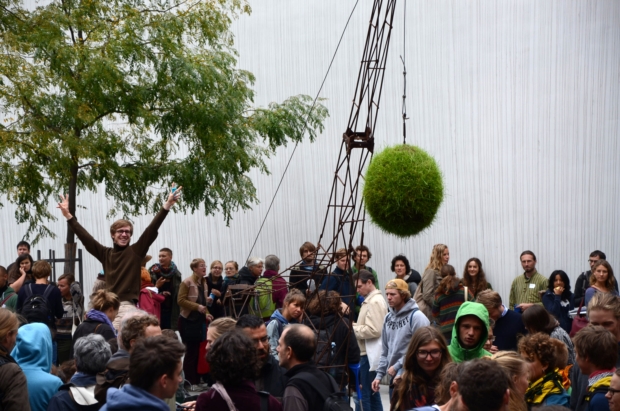While agreeing with many points of van den Bergh's excellent review of the growth versus climate debate, I would like to point to a fundamental misrepresentation of the quoted research on degrowth: degrowth is not a strategy "aimed at reducing the size of the GDP".
In fact, the degrowth proposition is that the relationship between fossil fuels/carbon emissions and GDP growth is mutual, and that a serious climate policy will slow down the economy, and a slower economy will emit less carbon - notwithstanding historical exceptions such as collapsing regimes burning their fossil fuels. Viable scenarios for successfully limiting climate change at a 2 0C rise involve both a slowing of the economy and a reduction of its carbon content. The question then is how to slow down while securing wellbeing?
The theoretical possibility of absolutely decoupling carbon emissions from GDP cannot be logically refuted, but it is unlikely to be physically or empirically possible. But let's agree to disagree. Both agnosticism and conviction about limits to growth are reasonable positions. My point here is to clarify the misunderstanding of what degrowth is.
Right or wrong, the diagnosis of Limits to Growth, and the degrowth camp today is that by the end of the century there are two possibilities. Either a collapse of output and welfare after crossing resource or carbon limits or a smaller economy with higher welfare. In the mid-term a decrease of welfare is also possible as climate disasters strike while GDP growth is still sustained by use of fossil fuels and reconstruction or defense expenditures.
The possibility space for a 'degrowth', or 'prosperous way down' or, in other words, a smaller and different economy with higher welfare needs to be distinguished from recession or depression. On this basis the policy and research question posed by degrowth scholars is not: "Which negative growth rate will get us there?, but "How do we land there by design and not by collapse? How do we create an economy that is low-carbon, low-output and secures well-being for all? This is the question that motivates interdisciplinary work on degrowth.
Ecological economists study macro-economic models and the social and policy conditions under which contraction can be stable and welfare-enhancing. Anthropologists, historians and social scientists examine how pre-capitalist civilizations prospered without growth, or how and why indigenous or intentional communities today manage without it. Engineers and legal theorists ask what technological and intellectual property models can sustain innovation without growth. Political theorists rethink democracy for a post-growth era. Focusing on "degrowth in a narrow sense of GDP decline" - which is not what those who write about degrowth understand by degrowth - van den Bergh misses this exciting research agenda.
On the Need for Collaboration Between Social Movements and Activisms By Lucie Bardos Not that long ago, I left North America and arrived fresh and starry-eyed in Lund, Sweden, ready to begin my master’s degree in a program entitled Culture, Power and Sustainability. In my second year, I decided to write my thesis about the Transition Town movement, a social movement out of Great Britain born ...

Das Konzeptwerk hat eine Replik auf postwachstumskritik.de geschrieben. Die der Webseite entsprechende Studie "Wirtschaftswachstum aufgeben? Eine Analyse wachstumskritischer Argumente" (Funke et al. 2015) fasst die Ergebnisse eines Seminars zusammen, in welchem sich die studentischen Autor_innen kritisch mit dem Konzept Postwachstum auseinandergesetzt haben. Die Autor_innen fragen "Müssen wir W...
Um dem demokratischen und integrativen Anspruch der Degrowth-Konferenz gerecht werden zu können, haben wir eine spannende Crowdfunding-Kampagne gestartet. Sie läuft nun 55 Tage und endet kurz vor der Konferenz. Unser Ziel ist es, dass möglichst viele Menschen an der Konferenz teilnehmen können und somit zu einem Wandel für eine Gesellschaft jenseits von Wachstumszwängen beitragen. Dafür ist [...]